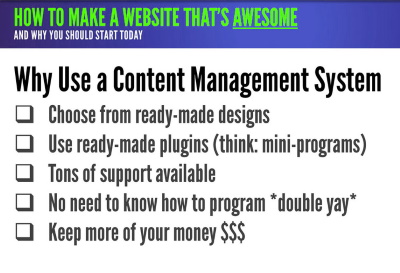An Argument for HTML Websites in a World Obsessed with WordPress
There is a reason why WordPress sites are so popular. They allow people to quickly create sites that function properly. When building a static HTML site, there are a number of things that can go wrong. If a person does not know what they are doing, and even for those who do know what they are doing, there exists the possibility of spending as much time troubleshooting the site as building it.
Although WordPress is popular, there are many people who are convinced that building a static HTML site is the better option. They talk about how easy it is to get nice-looking HTML templates and how software like Dreamweaver is so much easier to use. Let’s take a few minutes and look at the pros and cons of each form of building a website.
WordPress Is Awesome
As of 2019, 34 percent of websites are powered by WordPress. This is a four percent increase over 2018. If you are focusing solely on sites that are built using content management systems, then 60 percent of them are built using WordPress. Every month approximately 400 million people visit sites on WordPress, and annually more than 100 billion words are published using WordPress. To refer to WordPress as a juggernaut would be an understatement.
WordPress’ popularity stems from the fact that it is a content management system that is easy to use and is customizable. It has a seemingly endless library of themes, plug-ins, and security-related tools. And what makes it best is that it’s free. If a person is looking to start a website for their niche project, they can do it with little to no cost. The web design process is relatively seamless.

The only real cost a person would have building a website using WordPress would be the domain name and the hosting. Plug-ins make everything so easy. They make your SEO friendly. If we were to point out a downside to WordPress, it is the fact that the database on your server is large and is going to take up a ton more information than a static site.
By now you might be wondering what CMS means, as we have mentioned it a few times. A CMS, or Content Management System, is any open sourced or closed sourced system that allows users to easily and effectively manage the content on their website using a separate dashboard. You can think of as a layer that sits on top of the HTML or CSS that is human friendly. This is why most people aim to start their website on a WordPress host rather than something like a VPS.
Static HTML Websites Have Proven Themselves over Time
With the rise of CMS, some people have asked themselves, are static HTML websites still relevant? The reason why people got frustrated with static HTML in the first place was the fact that they were trying to use it forsomething that it wasn’t really designed to accomplish. HTML is a markup language. That means it’s not built to manage complex arrangements of files. However, anyone who has worked with a static HTML page knows that if you were building a small site on a budget, it was the best tool that was available at its time.

Still, with the advent of CMS’s, you may wonder under which circumstances a person would want to go with static HTML. A lot of it has to do with how skilled you are as a developer and with the purpose of your site. For example, if your site does not need full CMS functionality, for example, if you are building the standard brochure style site, then static HTML is going to be great.
The reason why CMS’s have become so popular is because they allow anyone with a little bit of training to go to the back end to make updates. Not everyone needs this feature though. This is a case where static HTML can do a great job. Probably one of the most compelling reasons to use static HTML is security. If you don’t sign into your WordPress site for six or seven months, when you finally do sign in, you may find a mess. You are going to have a number of unpatched security holes. This isn’t usually the case with a static HTML site.
Although we feel that static HTML sites do have their place, we also acknowledge that they are not for everyone and are not going to be the best option everywhere. We live in a society that is data driven. Technology that is able to interpret and disseminate data quickly and concisely leads the way. In this environment it is very clear to see the benefits of a CMS and see what static HTML pages lack. Both have their strengths and weaknesses. What is required is a clear understanding of when to implement either platform or how each platform is best implemented.
What do you prefer? Static HTML websites or a CMS like WordPress? Let us know why in the comments section below.